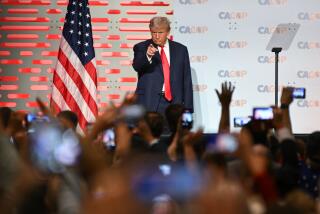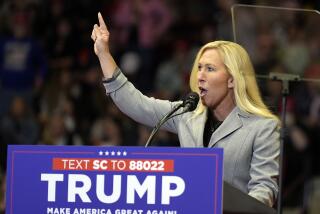California political parties couldn’t use ‘independent’ in their names under proposal
With potentially hundreds of thousands of California voters under the mistaken belief that they are registered as independent from partisan affiliation, newly drafted state legislation could end the confusion by forcing one minor political party to change its name.
The proposal, to be introduced in the state Senate on Friday, would ban any party from using the word “independent” in its official name beginning in next year’s statewide elections — a change largely directed at the American Independent Party of California.
“I think their numbers would decline dramatically,” said state Sen. Tom Umberg (D-Santa Ana), the bill’s author. “The name is deceptive.”
You’re not an independent voter in California if you checked this box »
The legislation follows complaints by elections officials and voters that the American Independent Party’s name wrongly implies that the group is nonpartisan. Those objections have grown louder as the ranks of voters who choose to be unaffiliated — designated in California as “no party preference” — have grown. They represent more than 1 in 4 voters, outnumbering the Republican Party’s share of the electorate.
In 2016, a Los Angeles Times investigation found that a sizable number of American Independent Party voters didn’t believe they had joined a political organization. In a poll of AIP voters conducted for The Times, 73% of those surveyed mistakenly thought they were unaffiliated voters. Once told of their official registration status, almost 40% of the AIP voters said they wanted to re-register without any party selection — what they thought they had done the first time.
Nor did many of those surveyed agree with the platform of the American Independent Party, an organization that traces its roots to the 1968 presidential candidacy of the late George Wallace, the segregationist governor of Alabama. Wallace’s failed presidential attempt that year hinged on qualifying for California’s presidential ballot with new political party identification.
The party’s current platform takes strongly conservative positions on marriage, abortion and gun rights. Party leaders chose President Trump as their presidential nominee in 2016, and the AIP website says Trump and Vice President Mike Pence will be its selections next year, “God willing.”
Markham Robinson, the party’s chairman, told The Times in 2016 he had previously supported changing the organization’s name but didn’t because of worries the party would lose its official status. Robinson didn’t respond to requests for comment on the new legislation.
Senate Bill 696 states that no political party can include in its name any of three references frequently made to unaffiliated voters: “decline to state,” which is the official designation the state used until 2010; the currently used “no party preference”; or “independent.” It would allow the AIP to retain its state certification if it selects a new name and receives approval from the secretary of state. But if the party refused to change its name, it would lose its certification in January.
The bill would also require state elections officials to notify every voter registered with a party whose name must be changed.
The Times investigation in 2016 found a number of notable Californians who had inadvertently chosen the American Independent Party, including several celebrities and — for at least a brief period in 2007 — Jennifer Siebel Newsom, the wife of Gov. Gavin Newsom.
The party had almost 518,000 registered voters in the last official statewide report — more than all other minor party registrations combined in California and 10% more voters than in 2013.
Current election law addresses only voter confusion between two parties, not whether voters who wish to be unaffiliated might also be confused.
“It’s an antiquated part of the elections code that needs to be remedied,” Umberg said.
The issue is particularly relevant for next year’s presidential primary, which was moved to March in hopes the state would have greater relevance in the national contest. Voters with no party affiliation will be able, as they were in 2016, to request a Democratic Party ballot to vote in the presidential primary. The Republican Party has not typically granted access to those voters.
But a voter registered as an American Independent will not be given that option. Several elections officials in the last presidential primary reported angry AIP voters who discovered on election day that they had chosen a party when they believed they had not. A Santa Cruz judge went so far as to allow an American Independent voter to change her registration after the June 2016 primary and instead cast a presidential primary ballot for Vermont Sen. Bernie Sanders after she petitioned the court that her membership in the sharply conservative party was a mistake.
Similar mistakes can happen in 2020, said Paul Mitchell, a California voting data expert who has spent years leading a public awareness campaign about the mix-up over the word “independent.”
“How many voters are going to think they can vote in the Democratic primary because they are ‘independents’ and then find out they can only vote for the AIP candidates?” he said. “This is when there is actual real harm.”
But state elections officials in the past have been reluctant to challenge the party’s name — fears that Umberg, who chairs the Senate’s elections committee, said are unfounded.
“The government can regulate speech when the words are being used to deceive individuals,” he said. “If you have a deceptive title, then we have an obligation to remove that impediment.”
Follow @johnmyers on Twitter and sign up for our daily Essential Politics newsletter
More to Read
Get the L.A. Times Politics newsletter
Deeply reported insights into legislation, politics and policy from Sacramento, Washington and beyond. In your inbox three times per week.
You may occasionally receive promotional content from the Los Angeles Times.







